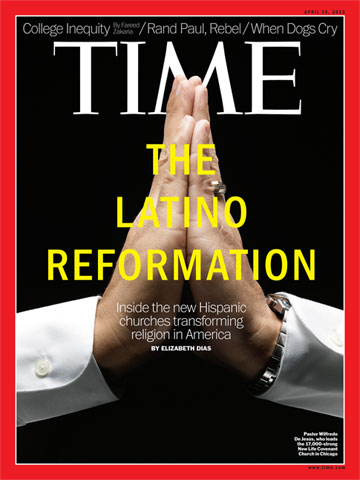
(6 of 7)
This kind of church treads on shaky theological ground. But it's important to remember that most evangélico churches are relatively new, still sorting out their place in a country where many in the congregation aren't yet citizens. And with the exception of the rare leader like Choco, many evangélico pastors rely more on experience than on any formal training in college, much less divinity school. There isn't much extra cash lying around in grassroots churches for courses on biblical history, and even if there were, the pastors face more immediate needs. Evangélico churches are often de facto healing centers for a population with limited health care benefits. They act as food banks for people with empty refrigerators. They house people avoiding street violence. There's a lot more going on there than just saving souls.
Ruiz, Paredes and Choco all preach against premarital sex, drugs, cursing and alcohol. None of them drink, and they ask their volunteers and staff to similarly abstain. At the same time, evangélicos are often willing to put women in the pulpit. That's a huge advance from many of their white evangelical siblings, who still tend to relegate women to music or children's ministries. Ruiz and his wife Lucia co-pastor El Calvario. Women solo-pastor some of the most dynamic Latino churches.
Evangélico churches often face immigration policy head-on. Choco preaches against the deportation system because it breaks up families, and Paredes is planning an immigration conference for La Roca members this spring. Those efforts help explain why some white evangelical church leaders are quietly urging Republican lawmakers to get behind comprehensive immigration reform. "When groups appear that are similar to one's own but with some striking ethnic or musical or cultural differences, they can appear threatening as well as promising," explains Mark Noll, a historian of American Christianity at Notre Dame. "I think it would be very positive for the evangelical world to look at issues of social concern--immigration, environment, employment--as theological issues."
A New Rock of Ages
The Catholic church now has 4,800 parishes with Latino programs of various kinds across the U.S. According to the U.S. Conference of Catholic Bishops, up to half of Latino Catholics in America are expressing their faith much as the evangelical community does--praying with hands raised, speaking in tongues, expecting the miraculous. One attempt to keep those members in the fold has been the Catholic Charismatic Renewal movement, which has gathered steam over the past few decades. But it may not be enough. Only 15% of all new priests ordained in the U.S. are Latino. "The challenge for the Catholic Church is to make the parish structure very flexible, very family-oriented," explains Alejandro Aguilera-Titus of the bishops' cultural-diversity office. "To the degree that we fail to do this ... we will continue to lose a significant number of Hispanic Catholics to other religious groups, mostly Pentecostals."
